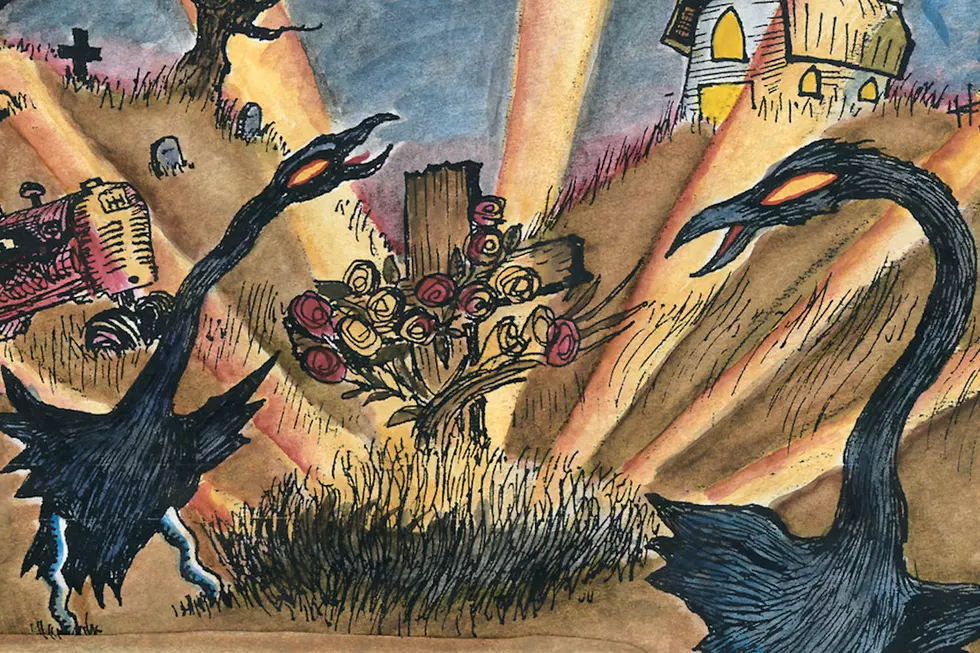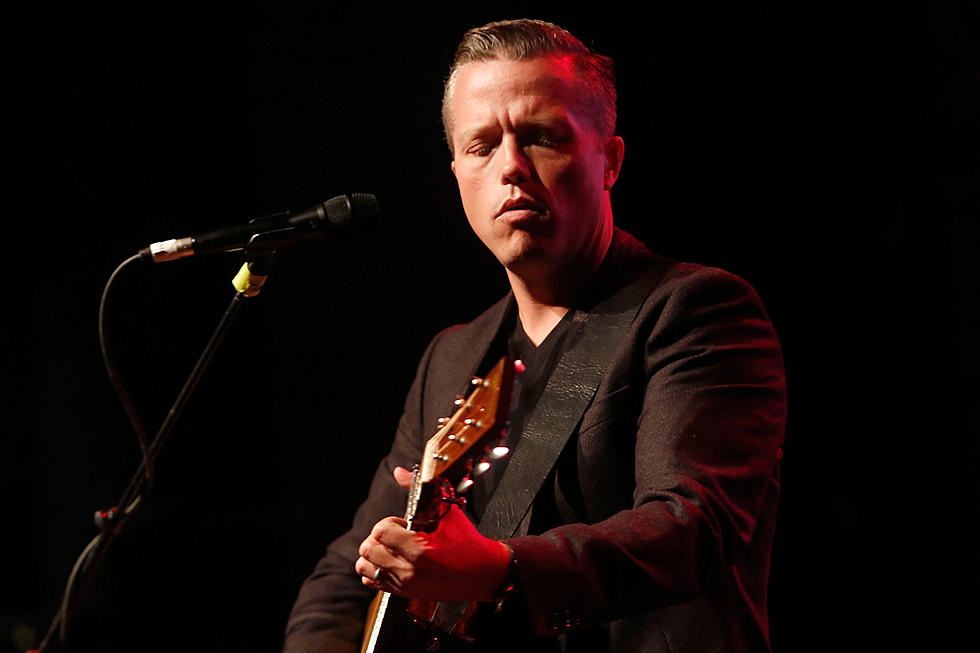Jason Isbell and the 400 Unit, ‘The Nashville Sound': Album Review
When you're an artist like Jason Isbell, the bar gets set higher and higher with each and every new album, creating a tough hurdle for his upcoming release The Nashville Sound. Though he established himself as one of the all-time greats in the world of songwriting during his time with the Drive-By Truckers and over the course of three solo albums, it didn't seem like a broader fanbase opened up to him until his 2013 LP, Southeastern. Isbell ripped his heart right out of his chest and slapped it on your turntable so you could hear every ounce of pain and sorrow, every ounce of joy and happiness, that he had experienced up until that point. The grooves of his arteries showcased a delicate artist, one who could capture the story of falling in love in a matter of minutes, or highlight the depths of pain that cancer brings to a relationship.
This isn't to say that Isbell wasn't doing this exact same thing on his debut solo record, Sirens of the Ditch, or the following two albums, Jason Isbell and the 400 Unit and Here We Rest. His debut rings eternal with tracks like "In a Razor Town" and "Brand New Kind of Actress," while the self-titled LP brought with it unforgettable journeys through "Cigarettes and Wine" and "No Choice in the Matter." Here We Rest produced many fan-favorites to this day, including "Alabama Pines" and "Codeine," among others. And let's be honest — this brief list doesn't even begin to scratch the surface of his lasting contributions to the Truckers.
But there was something about his songwriting on Southeastern that perhaps felt more accessible than ever before with new and old fans alike, and since 2013, the expectations for Isbell have continued to rise to seemingly unachievable levels. Yet, a couple of years following Southeastern he met and exceeded those expectations with the Grammy-winning album, Something More Than Free. And now, in 2017, Isbell is facing the most anticipation he has likely ever faced in his career with the release of The Nashville Sound.
Though Isbell is a master storyteller, he's also a master autobiographer, and opening The Nashville Sound is a pensive look at, potentially, his own career and life. As he sings "Am I the last of my kind?" over and over, he's asking an honest question, one that could easily be applied to the musical world in which he lives. But it's also a question that he could be applying vicariously to the working class across the country, those who convinced themselves that they were the forgotten minority leading up to last year's election cycle. And still, it could simply be an homage to the great John Prine, a living legend whom Isbell (and his wife and member of the 400 Unit, Amanda Shires) has grown closer and closer with over the last few years.
The same interpretive trajectory could be placed on any of the songs found on The Nashville Sound. The flat-out rocker, "Cumberland Gap," has one of the greatest lines of any Isbell tune—"As soon as the sun goes done / I find my way to the Mustang Lounge / And if you don't sit facing the window, you could be in any town" — and while one fan might interpret that as a nod to the indistinguishable similarities found in Small Town U.S.A., another may go deeper and look at the overall theme of the song as one that follows the struggles of an alcoholic, something Isbell knows a thing or two about.
That's the beauty of a Jason Isbell tune, and even more, the beauty of a Jason Isbell album. In a recent interview, he said, "I have learned that the process of trying to figure out what my album is about is better suited to critics and listeners than to me," and he leaves that door wide open on his latest effort.
The one thing that is not left to interpretation, though, is the completeness of The Nashville Sound. Never has Isbell constructed a more unabridged record than this; though fans and critics may enjoy jumping on one individual track and heralding it as Isbell's crowning achievement, the real story with The Nashville Sound is simply how perfect it is as one cohesive, full LP.
The opening trio of songs includes the aforementioned "Last of My Kind" and "Cumberland Gap," neatly wrapped up with "Tupelo," a track that starts out by continuing the "struggles of an alcoholic" interpretation that preceded it. The most powerful movement on The Nashville Sound is found in the next few tracks, though, as Isbell and company — keyboardist Derry deBorja, drummer Chad Gamble, bassist Jimbo Hart, guitarist Sadler Vaden, and fiddler Amanda Shires — shine on "White Man's World," "If We Were Vampires," and the magnum opus, "Anxiety."
The former two tracks have been unveiled to fans prior to the album's release, and both have been examined ever so closely. In "White Man's World," Isbell is clearly stating where he's at in both the current political landscape and the music industry. The title itself beckons the listener to consider the results of the presidential election of 2016, but the lyric, "Momma wants to change that Nashville sound / But they're never gonna let her," seems to take aim at Music City.
That song is followed with what many are proclaiming to be one of Isbell's most beautiful and heartbreaking tunes ever, "If We Were Vampires." A reflective look at life, death, and love, "Vampires" is an emotional reminder of both Isbell's and Shires' staggering talent, being able to shift from a politically- and professionally-motivated track like "White Man's World" to a crushing song like this, one that reveals more and more poignant depth with every spin.
"Anxiety," though, is the song that will be discussed and praised by fans and critics a hundred years from now. It is Isbell's masterpiece, and the most dynamic, well-rounded song on The Nashville Sound, not because it merely showcases the frontman's talents (though it does), but because it highlights all of the powerful and moving aspects of the 400 Unit. From start to finish, every single instrument and note, every single lyric, joins together to create an achievement that serves as a reminder of the power of Americana music, and Isbell's place in the genre's history books.
As that second movement wraps up, the rest of the record flows smoothly into "Molotov," the quintessential "song of the summer" if Isbell ever wrote one, and "Chaos and Clothes," a song that we think was inspired by Isbell's friend, Ryan Adams. (We're serious. Spend some time with the lyrics and compare it to the heartbreak that Adams has experienced over the last few years, coupled with the themes in "I See Monsters" from 2004's Love Is Hell—not to mention the "black metal T-shirt" reference.)
From there, Isbell gives fans the final two tracks, "Hope the High Road" and "Something to Love," the former highlighting his rock and roll personality and the latter his softer, singer-songwriter edge. That last track takes the thoughts of the opening tune and, though it doesn't answer the question "Am I the last of my kind?," it does provide the listener with a bit of guidance as the record comes to a close: "I hope you find something to love / Something to do when you feel like giving up / A song to sing or a tale to tell / Something to love, it'll serve you well."
If Isbell ever pondered giving up — if he ever truly questioned whether he is the last of his kind — he has found hope in singing songs and telling tales, and he has never told a more complete tale than that of The Nashville Sound. As the needle runs out on side B, you won't be putting the record back in its sleeve; you'll flip it back and start listening all over again as you try to determine what exactly that Nashville sound is, and why it's so damn important.
More From Diffuser.fm









